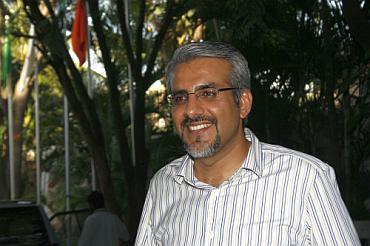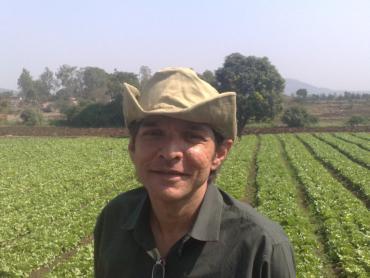
In the second of this three-part series on entrepreneurs who made it big without an MBA taken from author Rashmi Bansal's book Connect the Dots, we publish excerpts from Chetan Maini (of Reva Electric Car Company) and Samar Gupta's (of Trikaya Agriculture) stories.
In the first part we published excerpts of Kunwer Sachdev of Su-Kam Inverter and Sunita Ramnathkar of Fem Care Pharma.
The first time I saw a Reva car, I thought it was 'cute'. But hey, would I really want to own it? That's a question Chetan Maini is familiar with. On paper the electric (or battery driven) vehicle makes great sense. So why exactly do we stick to diesel and petrol?
Well -- it's complicated. There's the oil lobby, the auto lobby and the this-is-the-way-things-have-always-been-done. There just aren't enough people in the world who believe in this new technology. But then Chetan came along.
At 13, he was building go-karts. At 20, he built a solar powered car. At 24, he was leading an electric car project. At 31, he launched this car. And he is still working, perfecting, enhancing his vehicles.
Dreaming of the day that you and I will junk our gas-guzzlers and go electric.
At his nifty little factory in Bommasandra -- an industrial area just outside Bangalore -- I admire a couple of the 'next generation' Revas. I'm still not sure if I would buy one, but I am sold on the drive, the determination and the can-do spirit of Chetan Maini. Excerpts:
Like most of his classmates at Bishop Cotton, he started preparing for IIT JEE. But in a couple of months Chetan realised IIT was not the place for him.
"I wanted something more hands-on, something to do with automobiles," he declared.
"Why don't you apply to schools in the US," said his dad.
The University of Michigan was Chetan's first preference -- because of its proximity to the auto hub of Detroit. And fortunately, he was accepted.
"I studied mechanical engineering but I spent fifty percent of my time on extracurricular projects. In my first year itself I worked on a 'supermileage' car which would give 400 kilometres to a litre!"
In his second year, Chetan became very passionate about the 'solar car' project -- an inter-university competition where teams built a car from scratch. The University of Michigan team was one of 35 teams chosen to participate.
It was a completely hands on project -- from welding body panels to wrestling with machine parts.
"I was working with General Motors as an intern. I would be at GM from 7 am till 4 pm, drive two hours to the Michigan International Speedway where we tested the car... and spend 4 to 5 hours on the track!"
The months we spent building, testing and perfecting resulted in the University of Michigan team standing first among the 35 universities which raced their cars.
At the end of the race a rival team member remarked to Chetan, "We spent only $40,000 while you guys spent a million dollars, so of course you came first!"
Chetan replied, "Sure, but we put our heads together and raised the million dollars. You could have done that as well!"
It was an important lesson in teamwork -- from getting the B-school guys to help in raising sponsorship, to understanding weather and solar patterns. The University of Michigan pooled in many hands, many heads and many hearts, to make it happen.
Next stop: World Solar Championships in Australia. Racing across the outback from Darwin to Adelaide -- a total of 3,200 kms -- competing against the likes of Mazda and Honda!
"On day one we actually finished ahead of Honda and everyone was shocked. How could twenty year olds beat large OEMs?"
For Chetan, it was an awakening.
"Anything is possible," I realised.
Back at college, Chetan spent his final year working on a formula race car.
"To me these projects were my education. I enjoyed my classes and got decent grades. But the night before an exam you would often find me reading about things which interested me. And had nothing to do with the syllabus!"
At this point, Chetan got excited about electric cars.
"We were four friends who understood each other very well. We would meet around once a month and put together business plan ideas in this area."
One of the four friends was Dave Bell, whose father Dr Lon Bell was a PhD from Caltech. Dr Bell had founded a company called Technar -- which he'd sold to TRW -- and was looking for something interesting to do.
He said, "Well this sounds really good! Why don't you come and join me?"
Thus in 1991, Chetan joined Dr Bell's start-up.
"In the first summer we were just seven of us in the company. We built the platform of an electric car and evaluated many different technologies."
It was a huge learning experience but Chetan felt he needed to study further. So he took a year and a half off for a Master's at Stanford. Apart from attending a great programme which integrated mechanical and electrical engineering, Chetan got involved in building a hybrid-electric car.
After graduating, he returned to work with Lon Bell at Amerigon. The company continued to work on electrical vehicle technologies but also moved into other high-end automotive technologies.
There was much to do there but Chetan was feeling the urge to return home.
Excerpts from the book Connect the Dots by Rashmi Bansal published by Eklavya Foundation, Rs 150'.

You meet people like Samar Gupta at Bombay Gymkhana. They claim to be in 'manufacturing' or 'consulting' -- and have business cards to prove it -- but no one knows exactly what they do.
The truth is most of them don't do anything, because they don't need to. Samar could have been one of them.
Son of Ravi Gupta, the iconic founder of Trikaya Advertising, he was comfortably placed to lead a life of ease. Not particularly ambitious, at 32, Samar was happy 'helping out' dad in his hobby business of agriculture.
The 'Wake up Sam' moment came when Ravi Gupta passed away at the age of 59. Leaving behind a small company which was losing Rs 2 lakhs a month, and was probably a crazy idea to begin with.
Well, challenge brings out the best in us and so it was to be. Samar put on his hat, picked up the hoe and cracked the whip. With grit and determination, head and heart, he made a roaring success of the business.
In doing so he became a lover of plants, a patron of fruits, a son of the soil.
Samar's story tells me that whether you are born with a wooden, silver or platinum spoon, life is about finding 'meaning'. Something to do on this earth which fires your spirit, moves your soul.
So get down, get dirty, get going... find it!
Liberalisation was just kicking in, the share market was booming. Ravi Gupta was taking money out of one successful business -- the advertising agency -- and pumping it into a basket case. Agriculture.
Samar said, "Why don't you just invest in the market, build your retirement fund!"
But Ravi Gupta would have none of it.
"This is where I definitely give him credit. He had the vision to start the business -- and stick with it back then."
Sensing the pain point, Samar agreed to step in and handle the marketing side.
"I went and met all the five star hotels and very passionately told them, "We can give you broccoli, we can give you iceberg lettuce. All the stuff you are importing, we can give you at 1/4th the price."
The chefs were delighted, until a few weeks later Samar returned with a sorry face. Four out of five crops were still failing, so how could he guarantee supply?
"You can do it once, you can do it twice, but the third time you cut a really sorry figure. I had a big showdown with my dad."
What was the point of marketing two tons of Chinese cabbage when ultimately, you produced only 20 kgs? Why bother to hardsell to clients?
"I was really rude to my father, I told him he was just flying a kite."
Ravi Gupta was hurt, but in his characteristic quiet way he said, "Come with me. I will show you what we are doing on the farm."
It was summer, extremely hot. There was a manager on the farm by the name of Kishore who promised that in seven days, a couple of truckloads of Chinese cabbage would be harvested.
"Come, let's go see it," said Ravi Gupta.
There was no pakka road; after trekking half a km in the mid-day heat, father and son arrived at the plot. To find a patch of land which had not been ploughed. Where seeds had not even been sown.
Kishore had been lying through his teeth.
"We looked at each other and said, 'This is what we are up against'!"
Kishore was fired on the spot. Packets of imported seeds were found, spilling out of an abandoned drum. It was not a pretty picture.
"You see, my father was used to working with professionals. In Bombay, if you told a manager to do something, it got done. You did not personally check on them, or micro-manage!"
Despite these horrors, Ravi Gupta did not give up. He continued to handle the production in his gentle, love-thy-neighbour style. And gave Samar a free hand -- in marketing. As well as a 50% stake in the company, to keep him motivated.
And yet, in 1997, Trikaya Agriculture was making losses; it was heavily subsidised.
"I remember one month there was no money to pay salaries and my dad simply called the Trikaya accountant and wrote out a cheque for one lakh rupees."
And this is the way it might have continued, dheeme dheeme, aaraam se (slowly), had Fate not intervened.
In late 1996, Ravi Gupta was diagnosed with stomach cancer. He passed away in May 1997, at the age of 59.
"He would not even discuss the possibility of dying... let alone a formal handover or division of assets. It was just so sudden...," he trails off.
The family got lucky. Grey Advertising from New York already owned a 55% stake in Trikaya Advertising. They were keen to buy out the rest. Narottam Sekhsaria was MD of Gujarat Ambuja Cement -- an important client of Trikaya and a close friend of Ravi Gupta.
He negotiated the deal, and it was a sweet one.
"My mom did a brilliantly generous thing, rarely done in most bania families. She kept 2/5th of my father's estate and divided the rest equally among the three of us."
Hmm, lucky you! Aagey kaam karne ki zaroorat nahin (With that kind of money nobody would want to work anymore)!
But, it wasn't quite like that. Although there was a sizeable 'cash' element to the settlement, access to it was limited for the first three years. And, Samar got substantially less. Instead, Sekhsaria transferred all the shares of Trikaya Agriculture to him.
He said, "Samar, you may not see it now but one day you will thank me for this."
And, he does.